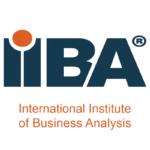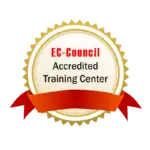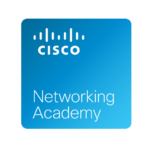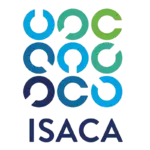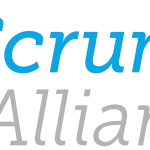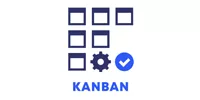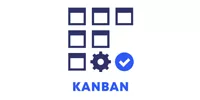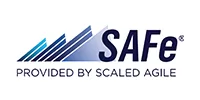- Courses
 Business Management
Business Management IT Networks and ITSM
IT Networks and ITSM Data Management
Data Management Information Security
Information Security Software Development
Software Development Digital Transformation
Digital Transformation Graphic Design
Graphic Design
- Career Paths
- Vendors
Project Manager Pro Career Path
Master Project Management and Lead with Confidence
In Collaboration With industry experts

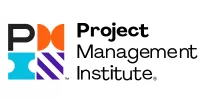
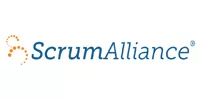








Overview
The U.S. Bureau of Labor Statistics (BLS) projects a 7% growth in employment for project management specialists from 2023 to 2033, outpacing the average for all occupations. The growing demand for project managers is attributed to factors like digital transformation initiatives, the need for remote project management, and the widespread adoption of agile methodologies.
The Project Manager Career Path is designed to equip professionals with the skills, knowledge, and certifications needed to successfully lead projects across various industries. Project management is a high-demand field, with organizations increasingly relying on skilled professionals to plan, execute, and deliver projects efficiently while managing risks, budgets, and timelines.
Key Learning Areas in Project Manager Career Path
-
Project Planning & Scheduling
- Learn how to create detailed project plans, set milestones, and allocate resources effectively.
- Tools like Microsoft Project help streamline project tracking.
-
Traditional Project Management (PMP)
- Master fundamental project management methodologies, risk management, budgeting, and stakeholder communication.
- PMP certification prepares professionals for leadership roles in structured project environments.
-
Agile & Scrum Frameworks
- Gain expertise in Agile methodologies, including Scrum, Kanban, and Lean project management.
- Certifications like Certified Scrum Master (CSM) and PMI Agile Certified Practitioner (PMI-ACP) prepare professionals for Agile and hybrid project environments.
-
Process Improvement & Efficiency (Lean Six Sigma)
- Learn how to optimize workflows, reduce inefficiencies, and enhance quality through Lean Six Sigma principles.
- Helps project managers improve business operations and achieve process excellence.
-
Leadership & Communication Skills
- Develop essential soft skills like team leadership, stakeholder management, and conflict resolution to excel in high-pressure project environments.
Project Manager Career Opportunities & Growth
Graduates of this career path can pursue roles such as:
- Project Coordinator (Entry-Level)
- Project Manager (Mid-Level)
- Senior Project Manager (Experienced)
- Program Manager (Advanced)
- PMO Director / Chief Project Officer (Executive-Level)
Project managers are in demand in industries like technology, healthcare, construction, and finance, making it a flexible and rewarding career choice.
Who Should Enroll?
- Aspiring project managers looking to build a strong foundation.
- Professionals in IT, business, engineering, or construction aiming for leadership roles.
- Individuals seeking globally recognized project management certifications.
Create a Job-Ready Project Portfolio
With personalized support, hands-on labs, and a curriculum tailored to real-world scenarios, you’ll be ready to take on complex challenges and boost your career prospects.
+140 hours of extensive learning
Gain in-depth knowledge through a mix of instructor-led sessions and hands-on exercises.
Practical Workshops Sessions
Gain hands-on experience with tools and techniques in interactive workshops.
Certification with Credibility
Showcase your skills with a accregated certificate to enhance your professional profile
Industry-Relevant Curriculum
Learn practical tools and techniques tailored to solve real-world business challenges.
10% OFF For Limited Time
Career Opportunities for Project Manager Pro
Graduates of our Project Management Career Path are prepared for roles like Project Manager, Scrum Master, Agile Coach, and Process Improvement Specialist across industries such as IT, finance, healthcare, and manufacturing. With hands-on expertise in PMP, Agile, Lean Six Sigma, Microsoft Project, Jira, and Trello, they excel in planning, execution, and process optimization—ideal for leadership roles in dynamic, fast-paced environments. 🚀
Earning these certifications open doors to high-demand roles in project management, Agile leadership, and process improvement across industries like IT, healthcare, finance, and manufacturing.
Potential Roles:
✅ Project Manager – Lead projects, manage teams, and ensure successful delivery.
✅ Scrum Master – Facilitate Agile teams, remove roadblocks, and improve efficiency.
✅ Agile Coach – Guide organizations in Agile adoption and transformation.
✅ Lean Six Sigma Specialist – Optimize processes and drive quality improvements.
✅ Program Manager – Oversee multiple projects and align with business goals.
With global demand for project managers expected to grow by 33% by 2027, this career path provides a competitive edge for professionals looking to advance their careers and increase earning potential. 🚀
Our Graduates' Success Stories

Sama Serag Eldin

Akadiri Felix Olaolu

Ahmed Salah

Amr Mostafa

Ndobu Kikachukwu Kennedy

Mohamed Atef
Why Learn from CLS?
Years of Experience
Since 1995, we’ve been a trusted training partner, helping individuals and organizations achieve their goals.
Expert Instructors
Learn from with top experts in the industry guranteed and get career assistance and coaching.
Hands-On Learning
Our courses are designed with real-world projects and practical applications.
What you will learn in this career path?
Master Microsoft Project to plan, track, and manage projects with ease. Boost efficiency, streamline workflows, and stay on time and budget—an essential skill for every project manager.
- Module 1: Exploring the Project Environment
- Module 2: Getting Started with Project
- Module 3: Managing and Organizing a Task List
- Module 4: Shaping the Schedule
- Module 5: Managing Resources
- Module 6: Working with Calendars
- Module 7: Managing Costs
- Module 8: Task Types Settings
- Module 9: Resource Allocations and Conflicts
- Module 10: Schedule Constraints & Deadlines
- Module 11: Tracking Project Progress
- Module 12: Filtering and Grouping
- Module 13: Project Reporting
- Module 14: Customizing the Project Environment
- Module 15: Managing custom fields, Tables and Views
- Module 16: Importing and Exporting Project Data
- Module 17: Managing Project Templates and Sharing with SharePoint
- Module 18: Working with Master, Sub-Projects and Resource Pools
- Module 19: Advanced Dashboard & Visual Reporting
- Module 20: Analyzing Progress and EVM
- Module 21: Automating with Macros
• Explore the Project Environment
• Getting Started with Microsoft Project
• Modifying and Organizing a Task list
• Shaping the schedule
• Modifying Task Dependencies
• Working with Calendars
• Using Project Resources
• Entering Project Costs
• Task Type Settings
• Resolving Resource Over-allocations
• Setting Constraints and Deadlines
• Tracking Project Progress
• Reporting in Project
• Customizing the Project Environment
• Creating and Managing custom Fields, Tables and Views
• Importing and Exporting Project Data
• Managing Project Templates and Sharing with SharePoint
• Working with Master Projects, Sub-Projects and Resource Pools
• Advanced Dashboard & Visual Reporting
• Tracking and Analyzing EVM
• Automating with Macros
• Advanced Customizations with Project
Now including predictive, agile and hybrid approaches, the PMP Certification Training proves project leadership experience and expertise in any way of working.
General Management Skills
- Leadership, Communication & Negotiation Skills.
- Problem Solving Techniques.
System for Value Delivery
- Creating Value
- Value Delivery Components
- Information Flow
Stakeholder Performance
- Stakeholder Identification
- Stakeholder Analysis and Engagement
- Creating Productive Working Relationship
Team Performance
- Team Management and Leadership
- Team Culture
- High performing teams
- Leadership Skills
Development Approach and Life Cycle
- Predictive, Adaptive and Hybrid Projects
- Cadence and Lifecycle Phases for the Project
Planning The Project
- Team Structure and Composition
- Planning Communication and Physical Resources
- Procurement Planning
Project Work Performance
- Project Processes
- Balancing the Competing Project Constraints
- Monitoring New Work and Changes
- Learning throughout the Project
Delivery Performance
- Delivery of Value
- Deliverables and Quality
Measurement performance
- Effective KPI’s
- What to Measure
- Presenting Information
- Measurements Pitfalls
Uncertainty Performance
- Dealing with Ambiguity, Complexity and Volatility
- Opportunities and Threats
- Risk Processes
Tailoring
- Tailoring based on the uniqueness of the Project.
- Factors affecting Tailoring.
- Project Team Experience
- Implementing ongoing Improvement
- Develop Essential Management Skills – Enhance leadership, communication, and negotiation abilities to effectively manage projects and resolve challenges.
- Understand Value Delivery Systems – Learn how projects create value, optimize information flow, and align with organizational objectives.
- Engage Stakeholders Effectively – Identify, analyze, and engage stakeholders to build productive working relationships.
- Lead High-Performing Teams – Foster strong team culture, enhance leadership skills, and drive collaboration for successful project execution.
- Apply Various Project Lifecycles – Understand predictive, adaptive, and hybrid approaches to select the most suitable project methodology.
- Plan and Organize Projects Efficiently – Structure teams, plan communication, manage resources, and develop procurement strategies.
- Manage Project Workflows – Balance constraints, monitor changes, and ensure continuous learning throughout the project lifecycle.
- Deliver Value and Quality – Focus on achieving project deliverables while maintaining high quality and value for stakeholders.
- Measure and Optimize Performance – Utilize key performance indicators (KPIs), track project progress, and present insights effectively.
- Manage Risks and Uncertainty – Address ambiguity, complexity, and risks while leveraging opportunities for project success.
- Tailor Project Approaches – Adapt project management techniques based on project uniqueness, team experience, and continuous improvement.
1. Introduction to Agile and Scrum
- Agile Manifesto and Principles
- Scrum vs. Traditional Project Management
- Benefits of Agile Adoption
- Empirical Process Control & Iterative Development
- Agile Frameworks: Scrum, Kanban, XP, SAFe
2. Scrum Framework and Roles
- Scrum Team Structure & Responsibilities
- ScrumMaster: Servant Leadership & Team Coaching
- Product Owner: Vision, Prioritization & Stakeholder Management
- Developers: Self-Organizing & Cross-Functional Teamwork
- Scrum Values: Commitment, Focus, Openness, Respect, Courage
- Scrum Theory: Transparency, Inspection, Adaptation
3. Scrum Events and Execution
- Sprint Planning
- Defining Sprint Goals & Selecting Backlog Items
- Estimating Work & Creating a Sprint Backlog
- Daily Scrum
- Format, Best Practices & Common Pitfalls
- Sprint Review
- Demonstrating Work Done & Gathering Feedback
- Sprint Retrospective
- Identifying Improvements & Implementing Changes
- Definition of Done (DoD) vs. Acceptance Criteria
4. Scrum Artifacts and Backlog Management
- Product Backlog Management
- Refinement Techniques & Prioritization Strategies
- Writing Effective User Stories (INVEST Model)
- Sprint Backlog
- Task Breakdown, Assignments & Monitoring Progress
- Increment & Value Delivery
- Ensuring High-Quality Product Increments
- Role of DoD in Delivering Business Value
5. Agile Estimation and Planning
- Story Points vs. Time-Based Estimation
- Relative Estimation Techniques (Planning Poker, T-shirt Sizing, etc.)
- Velocity Calculation & Predictability
- Release Planning & Roadmapping
6. Scaling Scrum & Agile at the Enterprise Level
- Challenges of Scaling Scrum
- Overview of Scaled Agile Frameworks (SAFe, LeSS, Nexus, Scrum@Scale)
- Scrum in Distributed Teams & Remote Work Environments
- Aligning Multiple Scrum Teams & Managing Dependencies
7. Role of the ScrumMaster in Driving Success
- Facilitating Effective Scrum Events
- Coaching the Team & Enabling Self-Organization
- Handling Conflicts & Removing Impediments
- Agile Leadership & Change Management
- Metrics & KPIs for Scrum Success
8. CSM Exam Preparation & Certification
- Review of Key Concepts & Exam Tips
- Practice Questions & Mock Tests
- Understanding the Exam Format & Registration Process
- Next Steps After Certification: Career Growth & Advanced Certifications
- Understand Agile values and principles and how they align with Scrum.
- Master Scrum roles, events, artifacts, and rules to facilitate effective Scrum teams.
- Learn best practices for sprint planning, backlog refinement, and Agile estimation.
- Develop leadership skills to coach teams, remove impediments, and foster continuous improvement.
- Gain hands-on experience with Scrum implementation and real-world scenarios.
- Prepare for and pass the Certified ScrumMaster (CSM) exam with confidence.
- About PMI®
- PMI® Certification Programs
- Value of PMI-ACP®
- Certification Cycle
- Eligibility
- Exam Application
- Exam Pattern
- Exam Blueprint
- Contact Information
- Agility
- The Agile advantage
- Key Values
- Agile Triangle
- Agile Methodologies
- APM Framework
- Phases
- Time Value of Money
- ROI
- PV and NPV
- Internal Rate of Return
- Opportunity Cost
- Payback Period
- Prioritization
- Customer Valued Prioritization
- Minimally Marketable Feature
- Agile Compliance
- Agile Chartering
- Product Roadmap
- Product Backlog
- User Story
- Story Maps
- Wireframes
- Personas
- Agile Modelling
- Best Practices
- Collaborative Games
- Story Points
- Relative Sizing
- Theme and Epic
- Ideal Day, Ideal Time
- Planning Poker
- Wide Band Delphi
- Affinity Estimating
- Cost Estimation
- Time-Boxing
- Levels of Planning
- Release Planning
- Iteration Planning
- Daily Stand up
- Burndown and Burnup Chart
- Variance and Trend Analysis
- Cumulative Flow Diagram
- Agile Task Board
- Kanban Board
- WIP Limits
- Project and Quality Standard
- Agile Testing Quadrants
- Verification and Validation
- Test First Development and Test Driven Development
- Acceptance Test Driven Development
- Continuous Integration
- Refactoring
- Definition of Done
- Knowledge Sharing
- Technical Debt
- Information Radiator
- Agile Team Space
- Osmotic Communications
- Collocated Team
- Distributed Team
- Agile Tools
- Active listening
- Brainstorming
- Feedback Methods
- Emotional Intelligence
- EISA Framework
- Goleman Emotional Intelligence Model
- Collaboration
- Agile Leadership
- Adaptive Leadership
- Servant Leadership
- Negotiation
- Conflict Resolution
- Prioritization Factor
- Risk Management in Agile
- Risk Adjusted Product Backlog
- Expected Monetary Value
- Risk Management
- Burn-down Chart
- Risk Based Spike
- Metrics
- Velocity
- Cycle Time
- Earned Value Management
- Escape Defects
- Value Stream Mapping
- Waste in Software Development
- Retrospectives
- Control limit
- Process Analysis
- Process improvements
- Failure modes
- Coach failure and success modes
- Process Tailoring
- Shu-Ha-Ri
- High Performance Team
- Coaching and Mentoring
- Stakeholder Management
- Team Motivation
- Self Assessment
- Knowledge Sharing
- Problem solving
- Facilitation method
- Participatory Decision Models
- Agile Contracting Methods
- Vendor Management
- Principles of System Thinking
- Incremental Delivery
- PMI’s code of Ethics and Professional Conduct
- Understand Agile Principles & Mindset – Apply the Agile Manifesto and principles to drive adaptive project management.
- Master Agile Frameworks – Gain proficiency in Scrum, Kanban, Lean, Extreme Programming (XP), and other Agile methodologies.
- Facilitate Agile Teams – Foster collaboration, self-organization, and high performance within Agile teams.
- Plan & Manage Agile Projects – Implement Agile project planning, backlog refinement, iteration planning, and release management.
- Enhance Agile Estimation & Metrics – Use story points, velocity tracking, burndown charts, and Agile reporting techniques.
- Manage Stakeholders & Communication – Engage stakeholders effectively and ensure continuous feedback loops.
- Identify & Mitigate Risks – Apply Agile risk management strategies to ensure project resilience and adaptability.
- Drive Continuous Improvement – Utilize retrospectives, Kaizen, and Agile best practices to enhance team efficiency.
- Prepare for the PMI-ACP® Exam – Gain the knowledge and confidence to successfully pass the PMI-ACP® certification exam.
1. Introduction to Lean Six Sigma
- Overview of Six Sigma and Lean
- Benefits of Six Sigma and Lean methodologies
- Lean vs. Six Sigma – Key Differences & Integration
- Role of a Green Belt in Continuous Improvement
- Understanding Voice of the Customer (VoC) & Business Impact
2. Define Phase – Project Selection & Scope
- Identifying Business Problems & Opportunities
- Understanding Customer Needs & CTQs (Critical to Quality factors)
- Project Charter Development (Problem Statement, Goals, Scope, Roles)
- SIPOC (Suppliers, Inputs, Process, Outputs, Customers) Mapping
- Identifying Key Stakeholders & Gaining Buy-in
3. Measure Phase – Data Collection & Process Performance
- Types of Data: Qualitative vs. Quantitative
- Defining Key Process Metrics (KPIs, Defects per Million Opportunities – DPMO)
- Process Mapping & Value Stream Mapping (VSM)
- Introduction to Measurement System Analysis (MSA)
- Basic Statistical Concepts: Mean, Median, Mode, Standard Deviation
- Using Pareto Charts, Histograms, and Control Charts
4. Analyze Phase – Identifying Root Causes
- Understanding Variations and Process Capability Analysis
- Using Fishbone Diagram (Ishikawa) & 5 Whys for Root Cause Analysis
- Hypothesis Testing & Statistical Analysis for Decision-Making
- Regression Analysis & Correlation Studies
- Failure Mode and Effects Analysis (FMEA) for Risk Assessment
5. Improve Phase – Implementing Solutions
- Brainstorming & Prioritizing Improvement Opportunities
- Lean Tools: Kaizen, 5S, Poka-Yoke (Error Proofing)
- Design of Experiments (DOE) & Piloting Solutions
- Evaluating Cost-Benefit Analysis for Process Improvements
- Implementing Process Changes & Ensuring Stakeholder Alignment
6. Control Phase – Sustaining Improvements
- Developing Control Plans & Standard Operating Procedures (SOPs)
- Introduction to Statistical Process Control (SPC) & Control Charts
- Mistake Proofing (Poka-Yoke) to Prevent Process Failures
- Sustaining Lean Six Sigma Initiatives through Continuous Monitoring
- Handover Process & Transitioning to Daily Operations
7. Lean Six Sigma Tools & Software
- Overview of Minitab & Other Statistical Tools
- Practical Applications of Lean Tools: Kanban, JIT (Just-in-Time)
- Root Cause Analysis Using Data Analytics & Visualizations
8. Exam Preparation & Certification Guidance
- Review of Key Concepts & Tools
- Practice Questions & Mock Tests
- Test-Taking Strategies & Common Exam Mistakes
- Understand the Lean Six Sigma methodology, principles, and tools
- Learn how to identify and eliminate waste (Lean) and reduce process variation (Six Sigma)
- Gain expertise in DMAIC (Define, Measure, Analyze, Improve, Control) methodology
- Apply statistical and analytical tools for data-driven decision-making
- Develop the ability to solve problems, improve processes, and enhance quality
- Lead and support process improvement initiatives in any industry
- Prepare for and pass the Lean Six Sigma Green Belt certification exam
-
Basic project management knowledge (recommended but not required)
-
Familiarity with business processes and team collaboration
-
No prior certification needed – beginners and professionals welcome
-
For PMP: 36 months of project management experience (if pursuing PMP certification)
-
For PMI-ACP: 21 hours of Agile training (covered in this path)
-
This career path is designed for aspiring and experienced project managers, team leads, and professionals looking to enhance their project management expertise. 🚀
Boost your career with our certification
Master PMP, Agile, Scrum, Lean Six Sigma, and Microsoft Project to lead projects efficiently. Gain hands-on expertise with tools for career growth in project management. This certification validates your expertise in project planning, execution, Agile frameworks, and process optimization across industries.

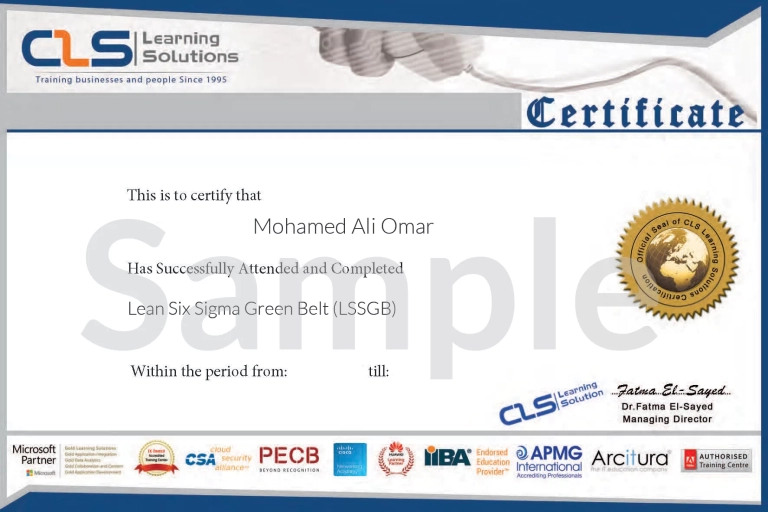
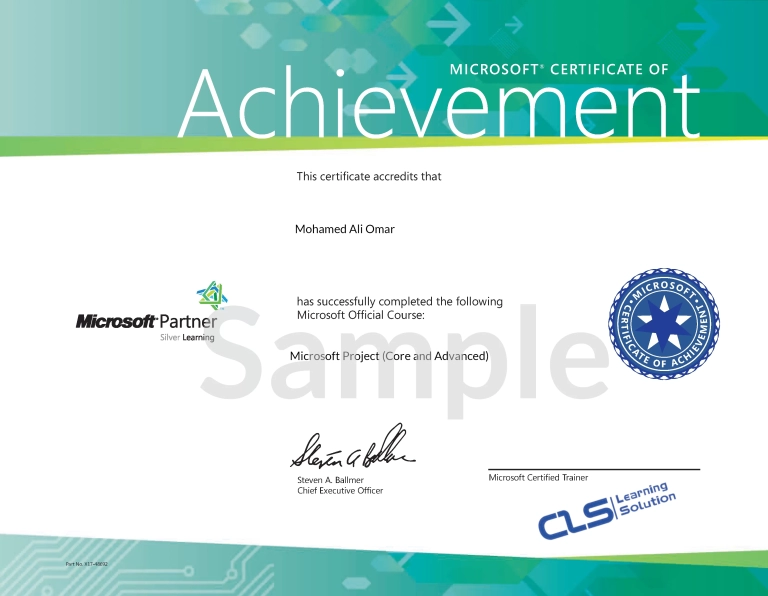
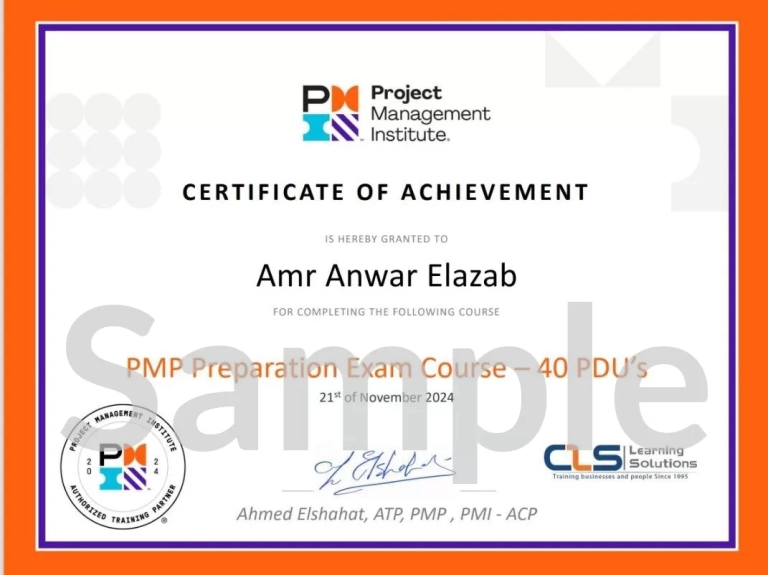
What Learners Are Saying

Amr Azab

Nada Osman

Samer Eltawansy

Inaam Badawi

Areej Sofy

Mohamed Saeed

Aziza moatz

Alyaa Gaber

Hisham Ibrahim

Mohamed Aldremly

Ahmed Elkomy

Mohamed Taha

Mohamed Hassan
Training Locations
Our classrooms in provide an in-person learning experience with direct interaction with instructors,These locations are equipped with modern facilities that support collaboration, practical training, and focused attention
Cairo Branch
- 5 Mesaha Square , Dokki - Cairo
Giza Branch
- 5 Mesaha Square , Dokki - Cairo
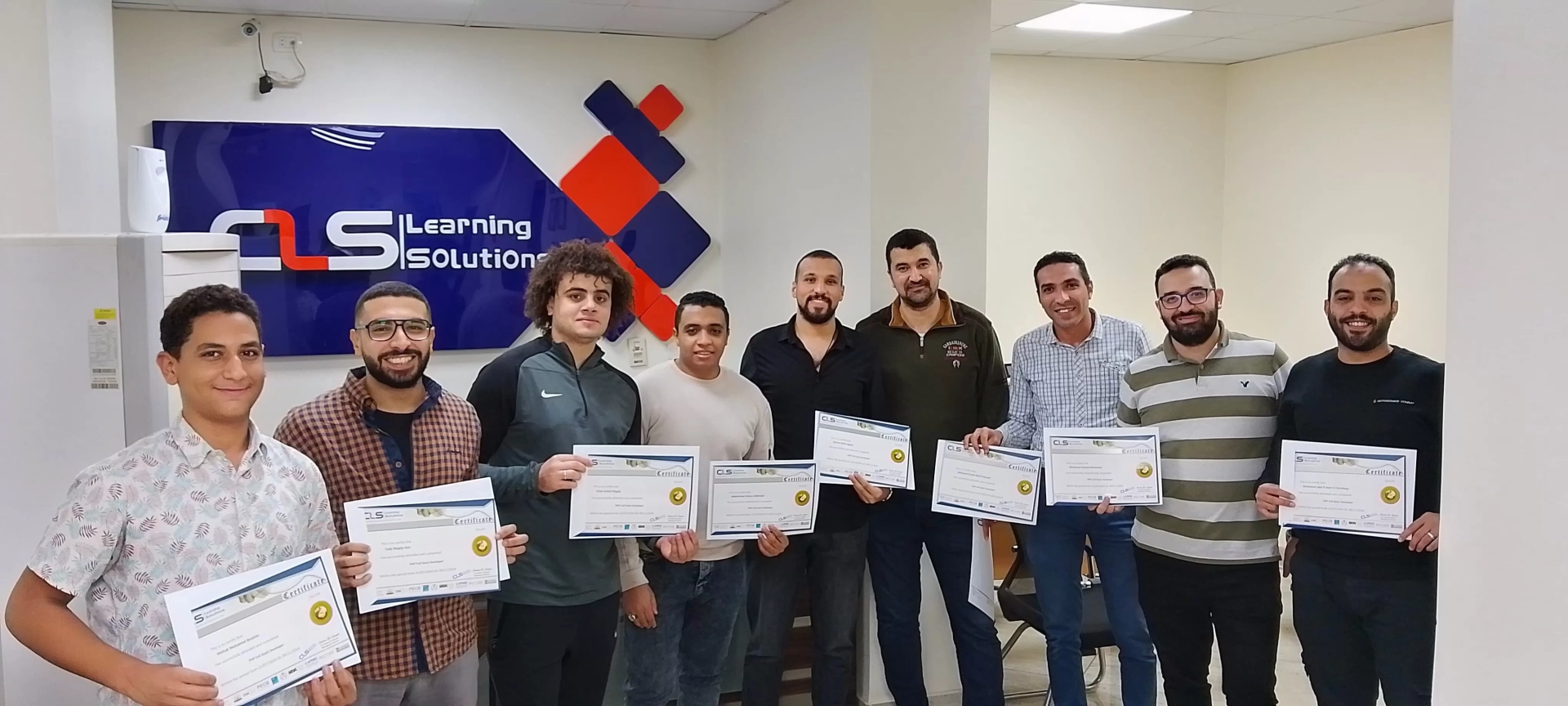

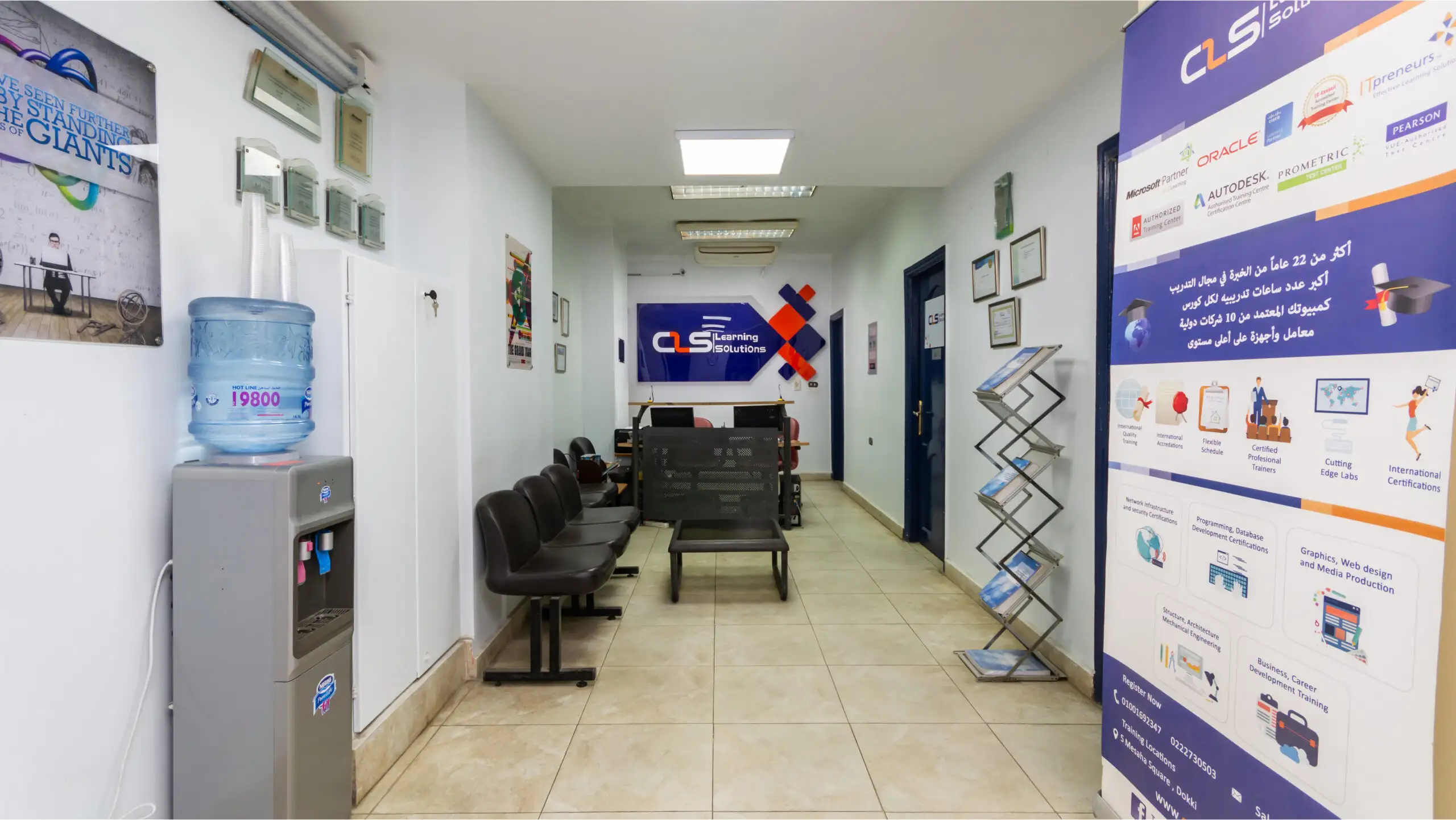
We offer two tailored virtual training formats, the Self-Paced Training to Enjoy the freedom to study anytime, anywhere and the Virtual Interactive Instructor-Led Training with flexible sessions that connect you with expert instructors in real time
Virtual Instructor-Led Training
- Live, at Programmable Hours
Self-Paced Training
- Learn Anytime, Anywhere!



We offer on-site training at your company’s premises. Tailored to your business needs, these sessions allow employees to learn without leaving the workplace.
Our expert instructors will deliver courses designed to enhance skills and drive performance, all in a familiar and comfortable environment.
- At your company’s premises


The CLS Learning Solution Advantage
Experience
We have been in the market since 1995, and we kept accumulating experience in the training business, and providing training for more than 200,000 trainees ever since, in Egypt, and the MENA region.
Premium Facilities
CLS facilities are well-equipped with strong hardware and software technologies that aid both students and trainers lead very effective smooth training programs.
Customer Support
We provide our clients with the best solutions, customized to their specific needs and goals. Our team is highly qualified to answer whatever questions you have.
Global Accredited
CLS is an authorized and accredited partner by technology leaders. This means that our training programs are of the highest quality source materials.
Up To Date
We keep tabs on every change in the market and the technology field, so our training programs will always be updated up to the World-class latest standards, and adapted to the global shape-shifting job market.
Certified Instructors
We select the best instructors, who are certified from trustworthy international vendors. They share their professional experience with the Trainees, so they can have a clear hands-on experience.
10% OFF For Limited Time
© 2025 - CLS Learning - Solutions | All Rights Reserved.



